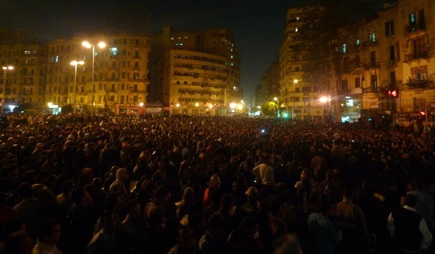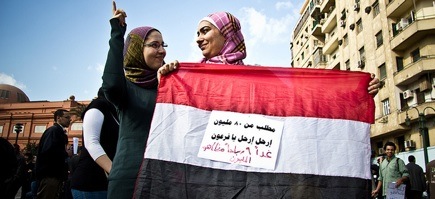
More than one million Egyptians protesting for democracy. Photo: Al Jazeera, flickr
(last updated 6.2.2011, 21:30 - updates in bold - check also new post: Saba Mahmood: Democracy is not enough - Anthropologists on the Arab revolution part II 22.2.2011 ) “The government would come down hard on even the smallest protest, and everyone would be arrested. Now, it’s as if the people are saying, ‘We’re not going to be afraid anymore.’ “I am very, very happy for the Egyptian people. I really am. It’s a wonderful development for the Egyptian people.”
That’s how anthropologist Carolyn Fluehr-Lobban comments the recent protests in Egypt. She has spent six years since 1970 living and conducting research in the Sudan, Egypt and Tunisia and is currently teaching “Arab-Islamic Culture and the West”.
In contrast to Carolyn Fluehr-Lobban, Norwegian anthropologist Unni Wikan is worried.
In an Op-Ed in yesterday’s Aftenposten, Wikan defended Mubarak and attacked the protesters.
She claims that “Mubarak is not a despot” and that he is “considered a very honorable man". In her opinion, Mubarak “did well / prove worthy of the situation in not giving in to the peoples’ voices on the streets". People - especially the poor she has studied for decades - don’t care for democracy. They want stability! Without Mubarak, the “criminal mob on the streets” would lead the country into chaos, she writes. Even today, when more than a million people protested in Cairo and other cities in Egypt, she insisted that Mubarak has the peoples’ support.
Of course, her article “traveled", among others to the Lebanese-American professor of political science As’ad AbuKhalil at at California State University, who posted a Google translation of her article and comments: “I suspect that you will both laugh and cry while reading this piece of rubbish".
UPDATE: Comment by anthropologist David H. Price in Counterpunch: “We can expect Wikan’s incredible claims to be paraded out by Fox News and CNN as part of a distortion campaign to support Mubarak’s efforts to cling to power, all in the name of balance.”
As you might have noticed, Wikan is argueing along similar lines as the Western political elite who is about to lose an important ally in the Middle East. For them, “stability” is more important than people power, as Maximilian Forte and his co-bloggers at Zero Anthropology explain in several blog posts, among others The Fall of the American Wall: Tunisia, Egypt, and Beyond and Encircling Empire: Report #11, Focus on Egypt, Encircling Empire: Report #12, FOCUS ON EGYPT: Revolution and Counter-Revolution and The Song of the Nonaligned Nile (by Eliza Jane Darling).
Forte quotes Hillary Clinton who said that ”our assessment is that the Egyptian Government is stable and is looking for ways to respond to the legitimate needs and interests of the Egyptian people.”
“Let’s be really clear about what is happening in Tunisia, Egypt, perhaps soon Israel/Palestine, and now Lebanon and Yemen", he states. “A wall of U.S. supported dictatorships and clients is collapsing.”
UPDATE: How should the West react? “The discussion in the West should focus on the factor we are responsible for and we can influence - the role our governments have played in suppressing the Egyptian people, writes Johann Hari in Huffington Post. “Your taxes have been used to arm, fund and fuel this dictatorship.”
See also Ryan Anderson’s post at Ethnografix Power, realpolitik, and freedom: Egypt and US Ideals about Freedom.
Meanwhile, over 150 academics have signed an Open letter to President Barack Obama, calling on Obama to support Egypt’s democratic movement. (You see the irony here of course… Western leaders fearing for a democratic Middle East. “The hypocrisy of western liberals is breathtaking: they publicly supported democracy, and now, when the people revolt against the tyrants on behalf of secular freedom and justice, not on behalf of religion, they are all deeply concerned", writes Slavoj Žižek in the Guardian).
UPDATE: The American Anthropological Association signed a statement of support for Egypt. But it’s mostly about the “losses to cultural heritage” and doesn’t say anything about Mubarak.
UPDATE: Maximilian Forte ay Zero Anthropology criticizes the AAA statement. Archaeologist Rosemary Joyce addresses the issue “valuing things over people” in a very interesting post. She also questions protection of Egyptian antiquities out of concern for their status as “global cultural heritage”.

Anti-Mubarak protesters at Tahrir Square in Cairo 30.1.2011. Photo: darkroom productions, flickr
The keys to understanding what has driven millions of citizens to the streets are the tragic circumstances surrounding the deaths of two young men, writes anthropologist Linda Herrera in her text Two Faces of the Revolution at the blog Closer.
She tells the story of Mohammed Bouazizi in Tunesia who “overwhelmed by the burden of fines, debts, the humiliation of being serially harassed and beaten by police officers, and the indifference of government authorities", set himself on fire” and the Egyptian Khaled Said who was brutally murdered by Police.
She stresses that “contrary to a number of commentators in news outlets in North America and parts of Europe the two revolutions overtaking North Africa are not motivated by Islamism.” “These are inclusive freedom movements for civic, political, and economic rights” as this video below shows as well and is described in Robert Fisk’s report in the Independent: Secular and devout. Rich and poor. They marched together with one goal
UPDATE: In the Western hype about Islamists the Muslim Brotherhood, who denounced violence a long time ago has been demonized for too long", says anthropologist Petra Kuppinger. “While militant Islamist groups exist, they are increasingly marginal. The Brotherhood is certainly not one of them.”
“It is a revolution without a leader", says Adrienne Pine from the Department of Anthropology at the American University in Washington in the interview below. But that does not mean chaos. She’s blogging at http://quotha.net/
Historian Mark LeVine has conducted a great interview with the Egyptian journalist and blogger Hossam el-Hamalawy.
He gives us the bigger picture, conntects the local with the global:
Revolutions don’t happen out of the blue. It’s not because of Tunisia yesterday that we have one in Egypt mechanically the next day. You can’t isolate these protests from the last four years of labour strikes in Egypt, or from international events such as the al-Aqsa intifada and the US invasion of Iraq.
UPDATE: Anthropologist Karl Lorenz from Shippensburg University agrees. He’s not surprised about the protests. He believes that it is too late for reforms from Mubarak, because the people have wanted it for 30 years and it has not been done.
Anthropologist Daniel Martin Varisco wrote two comments All Eyes on Egypt and Yemen is not Tunisia or Egypt. Another anthropologist, William O. Beeman, explains why an Islamic Government in Egypt Might Not Be So Terrible.
UPDATE: Anthropologist Farha Ghannam writes about the rich symbolism of the Tahrir Square: “In a society sharply divided by class and gender, the square has been a place where all feel comfortable - young and elderly, rich and poor, men and women, Muslim and Christian.”
Sociologist Sherifa Zuhur shares her thoughts about the recent protests and how it is received in the West.
Anthropologist Jon Anderson questions the importance of social media - a topic that was also discussed at Savage Minds: Thinking about the importance of communications “revolutions”.
When looking for scientific publications, I made the same experience as Barbara Miller at anthopologyworks. Most articles deal with the (very distant) past. Miller concludes:
Clearly, you will have a better chance of finding out about early cat domestication, prehistoric ships, vessel residue analysis and even infant weaning during Roman times than you will have of learning about the social dimensions of today’s street protests.
(…)
I used the single search term “Egypt,” and I chose the publication dates of 2000-2010. Nearly 400 articles popped up. In scanning through them, I found that only 10 percent were related to contemporary social life. The other 90 percent of the references are dominated by archaeology with a sprinkling of biological anthropology as well as some non-anthro sources.
The sociology/anthropology repository of the American University of Cairo hosts several relevant publications.
Mats Ivarsson from the University in Lund (Sweden) has written a paper that sounds interesting: Impact of authoritarian pressure on the political blogosphere in Egypt. He “proposes the hypothesis that an authoritarian state actually will strengthen the quality of the information disseminated in the blogosphere” (pdf)
Then I stumpled upon the thesis Youth and internet in Egyptian party politics : balancing authoritarianism with agency in a condition of negative peace by Tone-Rita Henriksen from the University of Tromsø, Norway (pdf).
This is just a small selection of texts about the ongoing revolution in Egypt and around.
Maybe the best and most comprehensive round-up with links to tons of articles (and less chaotic than this one here) can be found at the blog Closer, compiled by anthropologist Martijn de Koning: Closing the week 5 – Featuring the Tunisia & Egypt Uprising
The Middle East blog tabsir.net has a round up What the Arab papers say
For more round-ups see posts by anthro-blogger Erkan Saka who has been active as usual, se among others Registering a revolution. Hail to the brave people of Egypt. A roundup and - media anthropologist John Postill’s bookmarks - mainly about the role of media in the Tunesia and Egypt uprisings.
My favorite news souces are Al-Jazeera (especially their live stream) and - as usual - Global Voices.
There, Gina Cardenas highlights women’s role in her post Egypt: Protesting Women Celebrated Online, a topic that has not been given enough media attention.
Very interesting also Egypt: A Voice in the Blackout, Thanks to Google and Twitter, showcasing the power of Egyptian peoples’ transnational ties and new technology.
I close this post with Global Voices video collection Egypt: Solidarity Pours in from Around the World
“Stupid multiculturalism, no clash of civilisations: When we’re fighting tyrants we’re universalists and building global solidarity. I’m proud of the Egyptians! They understand democracy better than we in the West (Zizek) - “This is the time to support Egypt” (Ramadan)
Check also new post 22.2.2011: Saba Mahmood: Democracy is not enough - Anthropologists on the Arab revolution part II
![]()
![]()


great post. thanks. i shall RT and buzz, it’s a must-read and look.